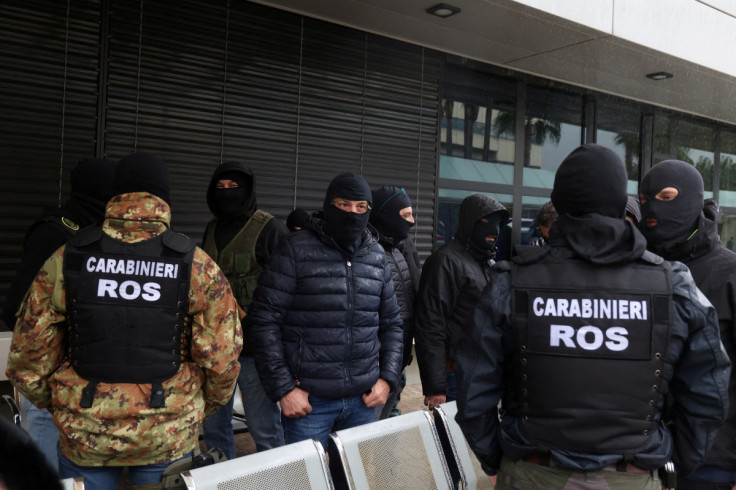Years Of Cat-and-mouse End As Top Mafioso Cornered In Italian Clinic

Italian investigators knew a lot of things about mafia boss Matteo Messina Denaro.
He liked wearing designer clothes, expensive sun glasses and Rolex watches, he loved video games and had a taste for luxury foods. He was also a ruthless killer who once claimed to have murdered enough people to fill a cemetery.
What they didn't know was where he was.
But on Monday, after 30 years on the run, the most wanted mafioso in Italy was finally captured, seized in a private clinic in the Sicilian capital Palermo after police found out he was receiving treatment there for cancer.
"It is a day of celebration when we can tell our children that the mafia can be beaten," said Italian Prime Minister Giorgia Meloni, who flew straight to Sicily when news of the arrest broke, underlining the importance of the capture.
Messina Denaro was born in the southwestern Sicilian town of Castelvetrano in 1962, the son of a mafioso. He followed his father into the mob and at 15 he was already carrying a gun. Police believe he carried out his first killing when he was 18.
The Castelvetrano clan was allied to the Corleonesi, headed by Salvatore "the Beast" Riina, who became the undisputed "boss of bosses" thanks to his ruthless pursuit of power.
Nicknamed "'U Siccu" (The Skinny One), Messina Denaro became his protege and showed he could be just as pitiless as his master, picking up 20 life prison terms in trials held in absentia for his role in an array of mob murders.
Details of his crimes emerged in the many court hearings.
Police say he was heavily involved in the planning of the 1992 murders of anti-mafia prosecutors Giovanni Falcone and Paolo Borsellino - crimes that shocked the nation and sparked a crackdown that led to Riina's arrest in 1993.
He was also held responsible for subsequent bombings in Rome, Florence and Milan in 1993 that killed 10 people in an apparently failed bid to force the government to halt its war on the Sicilian mob, know as Cosa Nostra (Our Thing).
He was also found guilty of helping organise the kidnapping of Giuseppe Di Matteo, 12, to try to dissuade the boy's father from giving evidence against the mafia. The boy was held for two years before he was strangled and his body dissolved in acid.
HOARDS OF MESSAGES
Messina Denaro went into hiding in 1993 as a growing number of turncoats started providing details of his role in the mob. He communicated with other mafiosi via "pizzini", small pieces of paper sometimes written in code distributed by messengers.
A mass of these notes was found in 2006 when police caught Bernardo Provenzano, who had led Cosa Nostra after Riina's arrest. In a letter to a contact, Messina Denaro said he couldn't believe how careless Provenzano had been.
"When I receive a letter, even from family members, I reply as quickly as possible and immediately burn the one that arrived," he wrote.
He never married, but was known to have a number of lovers. Denaro wrote that he had a daughter, but had never met her. He is also believed to have a son, but little is known about him.
As police repeatedly swept Sicily looking for clues about his whereabouts, more correspondence emerged showing they were dealing with someone who saw himself very differently to the way he was portrayed by his foes.
"I only care about being a fair man, I have made fairness my philosophy of life and I hope to die a fair man," he wrote in a letter dated Feb. 1, 2005, found in an abandoned hideout.
He quotes the bible and French writer Daniel Pennac, amongst others, and laments the fact he had little formal education.
In an eavesdropped recording from prison, Riina is heard complaining about his one-time protege, apparently perturbed by news he was investing in wind farms and angered he hadn't taken charge of the mafia, like he had.
"The only guy who could do something because he was straight... didn't do anything," Riina told a fellow inmate.
Despite his notoriety, prosecutors have always doubted that Messina Denaro became the "boss of bosses" after Provenzano's capture, saying it was more likely that he was simply the head of Cosa Nostra in western Sicily.
Nonetheless, the fact he managed to escape arrest for so many years showed he had a fierce, loyal following.
Whispers surfaced last year that he was seriously ill and prosecutors finally seem to have located him thanks to the fact he needed regular treatment at a Palermo clinic.
"We have not won the war, we have not defeated the mafia but this battle was a key battle to win, and it is a heavy blow to organised crime," Prime Minister Meloni said.
© Copyright Thomson Reuters {{Year}}. All rights reserved.





















